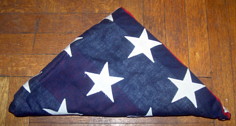|
Flag
Memories
by
Denny
Meyer |
 |
Several months ago
our local chapter of LGBT vets (AVER) received an inquiry from an elderly member of
the gay senior's group (SAGE); "Would you accept the
funeral flag of a WWI veteran?" This, of
course, is one of the most basic functions of any
veterans' association, and we immediately agreed.
The history of this flag is a long and convoluted
story of a long forgotten proud and patriotic hero
of The Great War, the passage of his family through
time and the twentieth century, and the wish of a
gay grandson to have his long departed grandfather
somehow honored and remembered.
Much of the story
has been lost in time. We can speculate that our WWI
vet was born in the late 1800s and volunteered to serve
his country. We know nothing of his life through the
first half of the twentieth century, nor even the
date of his death. Yet, we might imagine that he
lived into the 1950s (the flag has 48 stars) and that his funeral flag,
folded into a triangle by his honor guard, was
presented to
his widow. In due course, the flag passed on to his
son and then to his gay grandson. What little we do know is that when the grandson died in old
age over a decade ago, the
flag passed to his lover. One of the
grandson's last wishes was that the flag be given to
a group of gay vets as there were no members of his
family left to pass it on to. His lover kept it and
brought it along into a new relationship; and after he
subsequently died, the flag passed to his partner
who eventually got around to contacting us to ask that we please accept
it.
What is the
meaning of a veteran's coffin flag, kept neatly
folded into a triangle, passed from one elderly
American to another over at least more than half a century, from loving widow to son to
grandson and to lovers and strangers? Some others
might have thought of it as just an old musty piece
of cloth, something to be sold at a flea market or
tossed into a dumpster along with old sofas and
other tattered flotsam and junk of someone gone and
forgotten. But these Americans somehow thought to
preserve the last honor of a long ago American
Veteran.
The flag is just a
piece of cloth; but its meaning is in what it
symbolizes, which is American Freedom. The
flag and its meaning do not belong to any political
party. It belongs to every American, whether
they have been a citizen for five minutes or their
family has been American for five generations.
To some, in other countries, it represents a dream
and a wish for freedom and opportunity. Some
Americans take it for granted, and the beauty of
taking it for granted is the faith that our freedom
is everlasting. For a first generation
American like me, the flag is sacred. My
family were refugees in the late 1930s from the
Holocaust in Europe. As a young man in the
1960s, I saw student anti-war protestors, and I too
was against war. But, when they burned the
American flag, I felt as if I were on fire
too. I thought, "Its time to pay my
country back for taking my family in when they were
refugees." And I joined the US
Navy. That is what the burning flag inspired
me to do. I was young, gay, and idealistic;
now I'm an old man. But, if I could go back
and redo life's choices, I'd proudly choose to serve
my country again.
It is the American
freedom to choose that matters, whether you
are gay, straight, black, white, Jewish, Christian,
Muslim, male, female, or whatever. All
Americans are free to choose not to serve; and so
too every American should have the right to choose
to serve their country. When I was a young
sailor, fresh out of boot camp and wearing my
dress-whites proudly chest out and square jawed, I
visited New York City and found myself on Fifth
Avenue on some holiday; The Stars and Stripes
fluttered grandly on every tall building on the
city's most elegant artery, stretching off into the
distance. New Yorkers bustled about their
business, oblivious. But I was transfixed by
the sight; I wanted to salute every single
One. (one does not need to salute such
stationary displays; but had I done so, New Yorkers
would not have noticed the nutty little sailor boy
overcome with patriotism). My grandfather, who
came to America from the displaced-persons camps of
post-WWII Europe, would have stood at my side
pointing out each flag. Though he'd passed
away a decade earlier, I felt him with me on that
day. As a Jew, he'd been a slave laborer in
Berlin under the control of the Nazi Gestapo; he
understood freedom all too well.
Now, some forty
years later, I've had the honor and duty of
attending the funerals of gay vets, some who served
in WWII, some more recent. As their honor
guard plays Taps and folds their coffin flag, I
somberly salute. In the case of a gay vet, his
folded flag is quietly presented to a sister
or mother. Often, the family does not even
know that the vet was gay; and lovers are often not
even invited to attend let alone receive the last
honor of their sacrifice, the flag.
The last wish of the grandson, we were
told, was for his grandfather's flag to go to gay
veterans. The flag has been forwarded to AVER
national, to a farm in the American heartland. And so has come
to pass, over 100 years after he served his country
in a great war, a veteran's flag remains honored.
What will become
of our flags, I wonder, a hundred years after we
have served?
©
2009 Gay Military Signal
|